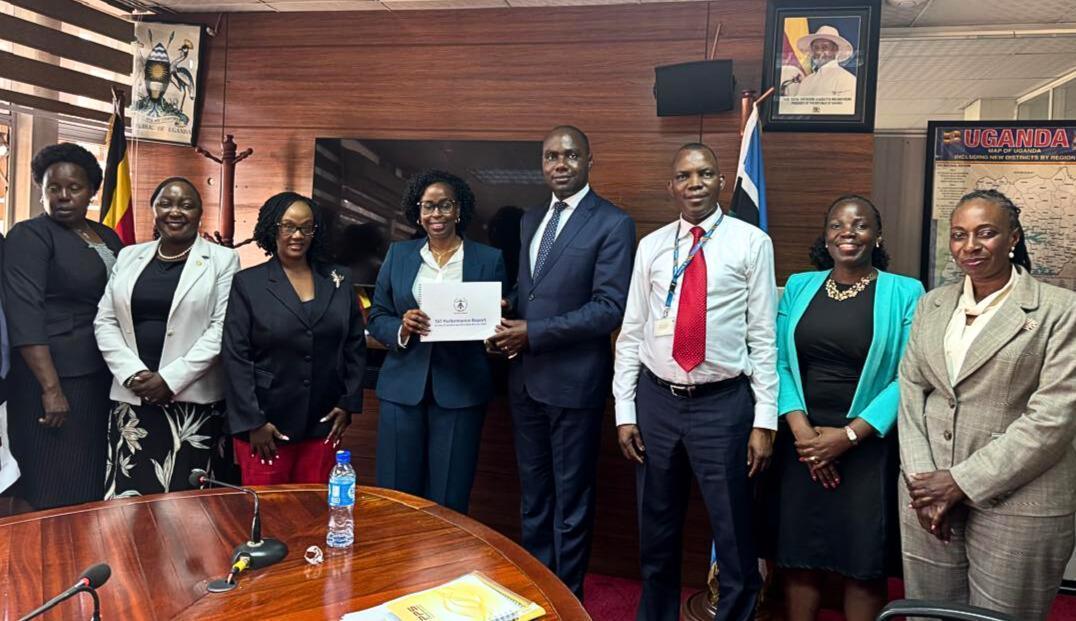Africa-Press – Uganda. The Tax Appeals Tribunal (TAT) has released its performance report for the financial year 2024/2025, marking a record-breaking year in the institution’s 27-year history.
The report, presented to the Minister of Finance, highlights significant achievements, including the resolution of Shs 506 billion in tax disputes — a 130% increase from the previous year.
Presenting the report, the leadership of the Tribunal, which assumed office at the start of FY2024/25, described the year as one of “great strides” and transformation, both in terms of performance and institutional reform.
According to the report, 266 tax disputes were resolved during the financial year — a 144% increase from the 109 cases concluded in FY2023/24.
Each resolved dispute represents funds either refunded to taxpayers or paid to the Uganda Revenue Authority (URA), effectively releasing money back into the economy. “When we resolve a case, that money which would otherwise be tied up in litigation is released back into the economy,” the Tribunal noted.
The Tribunal also reported that it received 410 new applications worth Shs 656 billion during the year, averaging 34 new disputes per month.
This marks a 127% increase in new applications since 2020, reflecting growing public trust in the Tribunal as an independent and impartial forum for resolving tax disputes.
To cope with the increasing demand, the Tribunal operationalised a second courtroom at its Kampala headquarters, enabling it to double its daily hearing capacity from 8 to 16 cases.
Recognising the need to modernise, the Tribunal began its digital transformation journey by launching a new website and opening official digital communication channels, including X (formerly Twitter), WhatsApp, and LinkedIn , which platforms have enabled real-time engagement with taxpayers and professionals and broadened access to information.
Furthermore, the Tribunal has initiated consultations to implement a comprehensive case management system that will fully digitise its operations from application filing to final decision. Once rolled out, the system is expected to improve efficiency by at least 35%.
Another key milestone reported was the reduction in the average time it takes to conclude a tax dispute from 13 months to 11 months.
The Tribunal has set an ambitious target to further cut this time down to less than 9 months, which would significantly enhance access to timely tax justice for both taxpayers and government.
Despite these achievements, the Tribunal’s leadership raised concerns about several persistent challenges.
Currently handling nearly 500 active cases worth Shs 1.3 trillion in total tax value, the Tribunal is severely under-resourced.
With only 29 staff members nationwide, the Tribunal highlighted the urgent need for more human resources, technical expertise, and modern systems.
“The critical, sensitive and highly technical work of the Tribunal requires that we attract the best talent and deploy modern systems. We need corresponding investment to match our growing case load,” the report noted.
The Tribunal also acknowledged the need for greater public awareness, particularly in regional cities such as Mbarara, Gulu, Mbale, and Arua, where it maintains registries.
Due to limited communication and outreach capacity including the absence of a dedicated public relations team sensitisation efforts remain below the required level, limiting access to services in some parts of the country.
In addition, the Tribunal stressed the importance of continuous capacity building. With taxation becoming increasingly complex particularly in areas such as international taxation, transfer pricing, telecommunications, and banking ongoing professional development is essential to ensure the Tribunal remains up-to-date and capable of handling high-level technical matters.
However, funding for training and learning remains inadequate. The Tribunal appealed to the Ministry of Finance and other stakeholders to prioritise funding for digitalisation, staff recruitment, public engagement, and professional development.
“We have shown that we deliver value for money. If we are well-resourced, the sky will not even be the limit,” the Tribunal’s leadership said.
The Tribunal reaffirmed its commitment to ensuring a fair, transparent, and efficient tax dispute resolution process.
It extended its gratitude to the taxpayers and the Uganda Revenue Authority for their cooperation and willingness to embrace new changes. “Our purpose remains to build trust in Uganda’s tax system.”
The tribunal says that by doing so, it will be a critical enabler of Uganda’s social and economic transformation.
For More News And Analysis About Uganda Follow Africa-Press






